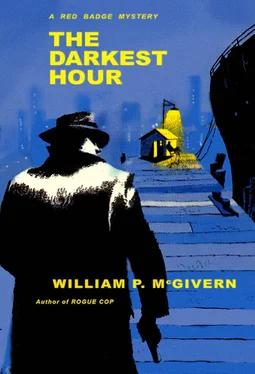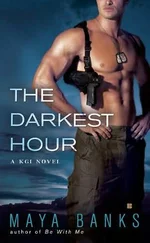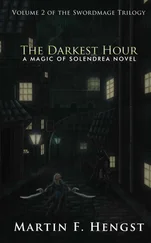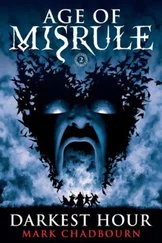William P. McGivern
The Darkest Hour
Steve Retnick’s release from Sing Sing caused a brief and seemingly casual stir of interest in the file room of the Thirty-First Detective Squad. There were three men present when Sergeant Miles Kleyburg, after a glance at his desk calendar, said: “Today’s the day. You think he’ll come back here?” There was no particular emphasis in the tone of his voice.
Lieutenant Neville stood in the doorway of his private office packing a short black pipe, and it was difficult to tell from his expression whether or not he had heard Kleyburg’s question. He was frowning slightly, and there was an impersonally irritable set to his lean, intelligent features. “You mean Steve,” he said at last, and walked past Kleyburg’s desk to the wide, dirt-streaked windows that overlooked the river. Lighting his pipe, he stared without enthusiasm at the view. Snow had fallen that morning and a high steady wind had packed it slickly and tightly on the streets and sidewalks. Gulls stood out brightly against the swollen, soot-dark river.
“I don’t know about Retnick,” Lieutenant Neville said, shaking his head slowly. “He’ll want to know about Ragoni. I hope—” Shrugging he left the sentence incomplete. “He’ll do what he wants, I suppose.”
“I’ll be glad to see him,” Kleyburg said, and the lack of inflection in his voice gave the words a curious weight.
Neville glanced at him. “I will too,” he said, and went about the business of lighting his pipe.
The third man in the room, a detective named Connors, studied a report on his desk and took no part in the conversation. When the lieutenant returned to his office a moment or so later, Connors stretched and got to his feet. He was a tall young man with even features and wavy blond hair. Except for excellent clothes and a certain aloofness in his manner, there was nothing distinctive about his appearance; his face was handsome but blankly so, unrelieved by humor or intelligence.
“I’m going out for a few minutes,” he said casually.
Kleyburg, a heavily built man with thin white hair and horn-rimmed glasses, nodded briefly at him but said nothing. He watched Connors saunter through the double doors of the squadroom, with no expression at all on his tired, solid face.
Connors went quickly down the dusty stairs, nodded to the uniformed lieutenant at the desk, and crossed the mean slum street to a small candy store. Edging through a crowd of youngsters at the comics book rack, he walked to the telephone booth at the rear of the shop. He dialed a number and when a voice answered, he said, “Mr. Amato, please. This is Connors.” After a short wait another voice spoke to him, and he said, “Connors, Mr. Amato. I just thought I’d remind you. Retnick is out today.” Listening then, he smiled faintly at the back of his well-groomed hand. “Sure,” he said at last. “I’ll find him. I’ll take care of it.”
Connors replaced the phone and went outside. A cold wind swept down the crosstown block, stirring up flurries of snow. Connors turned his collar up and hurried toward the station.
But Steve Retnick didn’t return that day or the next. And along the waterfront and in certain police stations there were men who waited uneasily for him...
It was eight-fifteen the following night when Retnick walked into Tim Moran’s saloon on Twelfth Avenue. He stopped just inside the door, a tall, wide-shouldered man who wore cheap clothes and a felt hat pulled down low on his forehead. His face was expressionless as he glanced around, but his eyes were cold and sharp under the brim of his hat.
The place wasn’t crowded at that hour; two dockworkers sat at the end of the bar, red-faced men in caps and bulky jackets. Standing between them was a huge, deceptively fat man whose round, childish face was slightly flushed with liquor. He wore an expensive camel’s hair coat that accentuated his size, and his voice rumbled over that of the tenor who was singing shrilly of Killarney from the juke box. Retnick knew the big man; he was called Hammy, and before showing up on the waterfront he had made his living as a sparring partner, a punching bag for fighters who had some brains as well as bulk. He was a simple-minded bully, dangerously strong and arrogant. Retnick wasn’t interested in him so he turned and walked slowly to the bar.
Tim Moran looked up from a glass he was polishing and his mouth sagged open in surprise. “Steve!” he said, as a smile spread slowly over his small red face. “Steve, boy! Welcome back, boy.”
“Thanks, Tim,” Retnick said, taking a seat.
“You’ve not changed at all,” Moran said.
This was almost true; the five years in jail hadn’t marked him physically. The planes of his dark face were sharp and hard. There was no gray in his close-cut black hair, and his body was like something made of seasoned wood and leather, tough and flexible, designed to endure. But there were changes.
“Five years older,” Retnick said, pushing his hat a bit higher on his forehead. Moran looked into his eyes then and saw the change in the man. He said, “Well, let’s celebrate, Steve. What’ll it be?” He looked away from Retnick as he spoke, troubled by what he had seen in those flat gray eyes. “What’ll it be, boy?”
“I’ll skip the drink,” Retnick said. “I’m looking for Frank Ragoni. Has he been in here?”
“No, Steve, I haven’t seen him for a week.”
“You know he’s missing, I guess.”
“Yes, I know that,” Moran said. “But it just don’t make sense.”
“Have you heard any talk about where he might be?”
“Not a word. I’d like to help. I know you were good friends, but—” He shrugged again, watching Retnick’s dark, hard face.
“Ragoni finished his shift at midnight,” Retnick said. “He was working at Pier Five, in the hold of a North Star Lines ship that night. He never got home. I’ve talked to his wife. She says he was in a good mood when he left for work. That’s all I’ve found out.”
“Why should he up and disappear?” Moran said. “He’s got a nice wife and family, and he’s the steady type. It don’t make sense, does it, Steve?”
“Not yet it doesn’t,” Retnick said.
The big man in the camel’s hair coat rapped on the bar and stared peevishly at Moran. “What do I do for a drink?” he said, his eyes switching to Retnick. “Send you a gold-plated invitation or something?”
Moran smiled quickly. “I was just talking to a friend I haven’t seen for a while. What’ll it be?”
“Whisky all round,” Hammy said, staring at Retnick. “Give your long-lost friend one, too. He looks like he could use it.”
“Right away, Hammy.”
When the drink was set before him Retnick studied it for a moment or so in silence, realizing that Hammy was still watching him from the end of the bar. The room was silent as Retnick finally lifted the glass, took a sip from it and nodded to Hammy. “Thanks,” he said, and the curious little interval of tension dissolved. Hammy began talking to the dock-workers again, and Moran put his elbows on the bar in front of Retnick.
“Watch yourself with him, Steve,” he said, rubbing a hand over his mouth to blur the words. “He’s mean.”
“Who’s he working for?”
“Nick Amato.”
“I picked up that drink too fast,” Retnick said. “Is Amato still riding high?”
“The men in his local stick behind him.”
“Do they have any choice?”
Moran found a rag and began to work on the shining surface of the bar. “I sell beer, Steve. To anybody who wants it. I don’t take sides in union politics. You know how it is.”
“Sure,” Retnick said. “I know how it is.”
Читать дальше

![Уильям Макгиверн - Завтра опять неизвестность [английский и русский параллельные тексты]](/books/35168/uilyam-makgivern-zavtra-opyat-neizvestnost-angli-thumb.webp)









